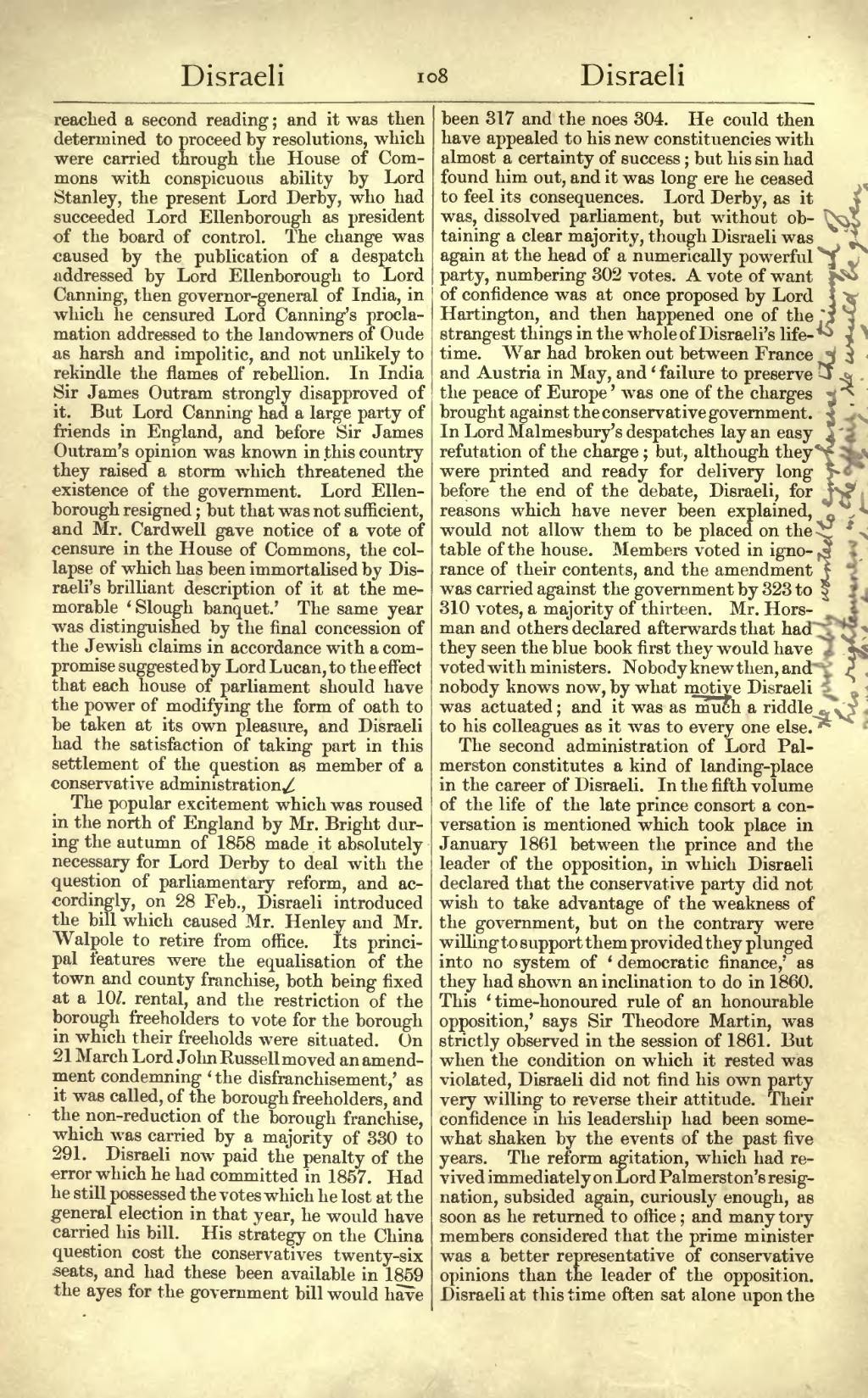reached a second reading; and it was then determined to proceed by resolutions, which were carried through the House of Commons with conspicuous ability by Lord Stanley, the present Lord Derby, who had succeeded Lord Ellenborough as president of the board of control. The change was caused by the publication of a despatch addressed by Lord Ellenborough to Lord Canning, then governor-general of India, in which he censured Lord Canning's proclamation addressed to the landowners of Oude as harsh and impolitic, and not unlikely to rekindle the flames of rebellion. In India Sir James Outram strongly disapproved of it. But Lord Canning had a large party of friends in England, and before Sir James Outram's opinion was known in this country they raised a storm which threatened the existence of the government. Lord Ellenborough resigned; but that was not sufficient, and Mr. Cardwell gave notice of a vote of censure in the House of Commons, the collapse of which has been immortalised by Disraeli's brilliant description of it at the memorable 'Slough banquet.' The same year was distinguished by the final concession of the Jewish claims in accordance with a compromise suggested by Lord Lucan, to the effect that each house of parliament should have the power of modifying the form of oath to be taken at its own pleasure, and Disraeli had the satisfaction of taking part in this settlement of the question as member of a conservative administration.
The popular excitement which was roused in the north of England by Mr. Bright during the autumn of 1858 made it absolutely necessary for Lord Derby to deal with the question of parliamentary reform, and accordingly, on 28 Feb., Disraeli introduced the bill which caused Mr. Henley and Mr. Walpole to retire from office. Its principal features were the equalisation of the town and county franchise, both being fixed at a 10l. rental, and the restriction of the borough freeholders to vote for the borough in which their freeholds were situated. On 21 March Lord John Russell moved an amendment condemning 'the disfranchisement,' as it was called, of the borough freeholders, and the non-reduction of the borough franchise, which was carried by a majority of 330 to 291. Disraeli now paid the penalty of the error which he had committed in 1857. Had he still possessed the votes which he lost at the general election in that year, he would have carried his bill. His strategy on the China question cost the conservatives twenty-six seats, and had these been available in 1859 the ayes for the government bill would have
been 317 and the noes 304. He could then have appealed to his new constituencies with almost a certainty of success; but his sin had found him out, and it was long ere he ceased to feel its consequences. Lord Derby, as it was, dissolved parliament, but without obtaining a clear majority, though Disraeli was again at the head of a numerically powerful party, numbering 302 votes. A vote of want of confidence was at once proposed by Lord Hartington, and then happened one of the strangest things in the whole of Disraeli's lifetime. War had broken out between France and Austria in May, and 'failure to preserve the peace of Europe' was one of the charges brought against the conservative government. In Lord Malmesbury's despatches lay an easy refutation of the charge; but, although they were printed and ready for delivery long before the end of the debate, Disraeli, for reasons which have never been explained, would not allow them to be placed on the table of the house. Members voted in ignorance of their contents, and the amendment was carried against the government by 323 to 310 votes, a majority of thirteen. Mr. Horsman and others declared afterwards that had they seen the blue book first they would have voted with ministers. Nobody knew then, and nobody knows now, by what motive Disraeli was actuated; and it was as much a riddle to his colleagues as it was to every one else.
The second administration of Lord Palmerston constitutes a kind of landing-place in the career of Disraeli. In the fifth volume of the life of the late prince consort a conversation is mentioned which took place in January 1861 between the prince and the leader of the opposition, in which Disraeli declared that the conservative party did not wish to take advantage of the weakness of the government, but on the contrary were willing to support them provided they plunged into no system of 'democratic finance,' as they had shown an inclination to do in 1860. This 'time-honoured rule of an honourable opposition,' says Sir Theodore Martin, was strictly observed in the session of 1861. But when the condition on which it rested was violated, Disraeli did not find his own party very willing to reverse their attitude. Their confidence in his leadership had been somewhat shaken by the events of the past five years. The reform agitation, which had revived immediately on Lord Palmerston's resignation, subsided again, curiously enough, as soon as he returned to office; and many tory members considered that the prime minister was a better representative of conservative opinions than the leader of the opposition. Disraeli at this time often sat alone upon the
